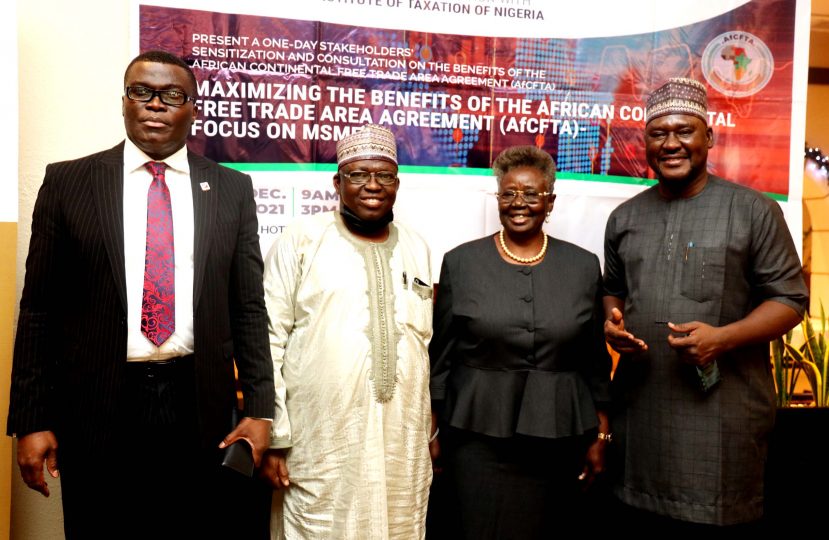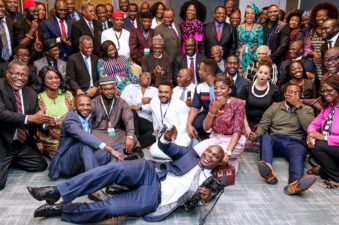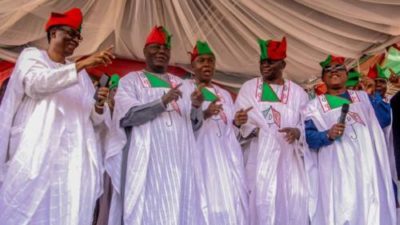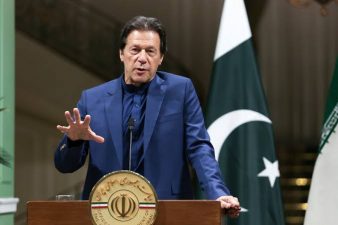*Government needs to ensure training, retraining among agencies, others for effective implementation – Discussants
*Economic opportunities unlocked for every citizen to trade across 55 nations with no impediment
*What customs, other agencies in member countries must know
*Nigeria urged to address issues raised by local manufacturers to show readiness – Forum
By BASHIR ADEFAKA
“There are people in Nigeria who can transform the whole Nigeria. In Aba, all machines and tools that we need in Nigeria can be manufactured there. What the government should do to make them work for the country is not to give them loan but give them money and buy cars for them, make them comfortable to do the job and tell them how many staff they should individually employ per a given period or annually and place them on watch. Don’t give them funding condition that they cannot meet,” lead paper presenter, Prof. Ishola Akintoye spoke to powers in appealing tone.
As Nigeria finally rises to beginning the implementation of Africa Continental Free Trade Area Agreement (AfCFTA) it signed, after taking much times to consider the pros and cons months ago, the need to reawaken the consciousness of citizens, particularly those in Micro, Small and Media Enterprises (MSMEs), to their respective duties, rights from the agreement, and how they can leverage on the inherent opportunities to maximize the benefits of it, has necessitated that a conference is organized for full and clearly highlighted sensitisation.
This brought three concerned bodies, who are players in the business of accountability for growth and development, together in a conference, where they did a break-into-pieces of the AfCFTA agreement and took it from the technicalities – ordinarily decodable only by professionals – to the understandable ground level, for clarity and usable material to a layman in business. The partners include the Civil Society Legislative Advocacy Centre (CISLAC), Chartered Institute of Taxation in Nigeria (CITN) and OXFAM Nigeria.
It was so planned that no one will be left behind as the rest of 55 African countries move to finally save the continent from the embarrassing underdevelopment status of centuries to a final collaborative socio-economic growth and development in no distant time with implementation of the agreement. The expected outcomes of the event would mean that participants clearly understand specific provisions of the AfCFTA as it pertains to product standardization and export value improvement to promote competitiveness within the African continent and that they would appreciate the inherent benefits of the Continental Agreement for value addition and improved export trade revenue derivation.
National Association of Small and Medium Enterprises (NASME), Small and Medium Enterprises Development Agency of Nigeria (SMEDAN), Nigeria Association of Small Scale Industries (NASSI), Manufacturers Association of Nigeria (MAN), members of the Journalism community and other relevant groups in the Organised Private Sector attended the event.
Delivering his opening address at the event, held in Sheraton Hotels and Towers, Ikeja, Lagos State capital, Executive Director, Civil Society Legislative Advocacy Centre (CISLAC), Malam Auwal Ibrahim Musa (Rafsanjani) the AfCFTA has great potentials to protect economies in Africa and called on the Federal Government of Nigeria, as it begins to implement the continent agreement, to see to how to partner with critical agencies and organizations to ensure that nobody in kept in the dark with regards to knowing what the it means and what the duties and rights are.

L-R: Lead Speaker, Prof. Rufus Akintoye, The Registrar/Chief Executive Officer, The Chartered Institute of Taxation of Nigeria (CITN), Mr. Adefisayo Awogbade, Immediate Past-President CITN, Dame Olajumoke Simplice, former Director-General, Lagos Chamber of Commerce and Industry (LCCI), Dr. Muda Yusuf and Executive-Director, Civil Society Legislative Advocacy Centre (CISLAC)/Transparency International –Nigeria CISLAC/Ti-N), Auwal Musa Rafsanjani at the stakeholders’ Sensitization and Consultation Forum on the Benefits of the African Continental Free Trade Area Agreement (AfCFTA) held in Sheraton Hotel, Ikeja, Lagos…on Tuesday, 7 December, 2021.
Outside his prepared speech, Rafsanjani, said: “In the implementation of AfCFTA, government should also see to making the business environment really easy not only for the international businesses but largely also for local businesses. This is so because the Ease of Doing Business will be nothing outside of this. To make this happen is to have the right policies and improve the pace and seriousness of the fight against corruption,” Rafsanjani said.
Mr. Henry Uche of OXFAM Nigeria, one of the collaborators for the event, gave his welcome address virtually on behalf of the organization urging participants to see to taking the conclusions of the conference far and wide in their various communities in ensuring that no one is left behind as the implementation of AfFCTA rides a start.
“In the implementation of AfCFTA, government should also see to making the business environment really easy not only for the international businesses but largely also for local businesses. This is so because the Ease of Doing Business will be nothing outside of this. To make this happen is to have the right policies and improve the pace and seriousness of the fight against corruption,” Rafsanjani said.
On behalf of Chartered Institute Taxation of Nigeria (CITN), one of the partners, 15th President, Mr. Adesina Adedayo, praised the coming together of the collaborators that brought the conference to life andn expressed the satisfaction of his institute to be part of it.
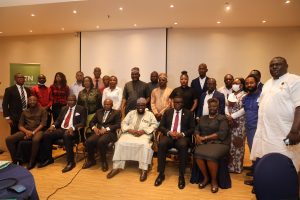
A cross section of participants at the stakeholders’ Sensitization and Consultation Forum on the Benefits of the African Continental Free Trade Area Agreement (AfCFTA) held in Sheraton Hotel, Ikeja, Lagos…on Tuesday 7 December, 2021.
He said President Muhammadu Buhari signed the AfCFTA agreement on 7 July 2019 and called for the stakeholders to leverage on the opportunities provided by it for the development of SMEs in Nigeria.
“On this note, it is my honour as President of Chartered Institute of Taxation in Nigeria (CITN) to declare open the conference,” he said.
At the event, Prof. Rufus Ishola Akintoye, Professorial Chairman, Babcock University and Tax Commissioner at the Tax Appeal Tribunal, took a cursory look at the continent, the prevailing situation on the ground in Nigeria and called on government of the country to get serious with its implementation of it because, according to him, if it took the Africa’s most populous country that long to carefully check and study the AfCFTA before it signed, it will not be in good place to find Nigeria wanting among 55 other countries at implementation.
Prof. Akintoye, also a teacher, carried the task to fulfillment when he practically downloaded facts from nooks and crannies of intellectuality to enable the participants, selected from across the sectors including the transparency and accountability civil societies, taxation institutions and the media, who are expected to further engage in the implementation process through public sensitisation, takeaways to do so.

L-R: Assistant Director, SMEDAN, Mrs. Gloria U. Nwakamma, Vice-Chairman, Association of Micro Enterprenuers of Nigeria (AMEN), Lagos State Chapter, Mrs. Funmi Nworie, Immediate Past-President,The Chartered Institute of Taxation of Nigeria, Dame Olajumoke Simplice and Executive-Director, Civil Society Legislative Advocacy Centre (CISLAC)/Transparency International –Nigeria, Auwal Musa Rafsanjani at the stakeholders’ Sensitization and Consultation Forum on the Benefits of the African Continental Free Trade Area Agreement (AfCFTA) held in Sheraton Hotel, Ikeja, Lagos…on Tuesday 7 December, 2021.
He said the essence of the conference, to the best of his understanding, was to deepen public understanding of AfCFTA to reflect and publicly engage government and policy makers and implementers as the implementation begins. Akintoye said this while delving profoundly into the backgrounds that led to coming together of African countries through the Organisation of Africa Unity (OAU) when it was established in 1964 and now as African Union (AU), to develop a collectively packaged independent integration towards making Africa strong part of world’s strong economies, away from crumbs-picking continent that some other members of the global community would prefer the back nations to be.
“Before anything at all, we need to know the background for the AfCFTA. We need to know where we are now, where we are coming from and where we are going. You know it took Nigeria a long time before signing this agreement. So, if we are implementing it now, like it comes imperative because we signed into it, we must take the implementation serious and not be the part of the team that will be lagging behind,” Prof. Akintoye had interpretatively said as lead paper presenter at the event.
Speaking further he said, “AfCFTA is simply an idea to have a single plan for all African countries to come together under an African integration developmental authority that will make all the member countries to grow together,” he said noting, however, that some members will lose because “when you open your doors, you will lose some fiscal benefits” but, he assured, the percentage of loss will be insignificant compared to what will be continentally benefited when the agreement becomes fully operational.
From the lecturer, it became clear why not only Nigeria but many other countries took their times before signing the Agreement as they needed to study and look meticulously into the concept, reason, implications and benefits that are accruable from it.
More interestingly, he said, the AfCFTA, when implemented, which becomes a must that members must be sincere and be fully committed about its implementation, will lead to increasing development and job creation that will come from borderless and no-visa movement that will happen across the 55 African countries. Also there will no impediment as there will be no customs border posts stopping any citizen from any member country from transiting and doing business across the borders; impetus of regional energy and infrastructural projects and opportunities for MSMEs, who constitute 80 percent of African businesses.
Coming down more, the tax expert said, “A Nigerian businessman in Nigeria can go to Ghana and establish his business there. All he needs to do is bring out his documents and register to do business there without hitches. If you bring rice into Nigeria and you are stopped, while this AfCFTA is in operational, it means Nigeria has defaulted”, which he said will not be expected to happen.
“Republic of Benin has consistently blocked trucks from Nigeria from crossing the country to other African countries. This is despite existence of ECOWAS Free Movement agreement. Their claim is that they are retaliating what Nigeria did to them, shutting down its borders against them for a whole year. These have been unilateral decisions by both countries that must be checked and stopped, if truly they are ready for AfCFTA,” Dr. Muda Yusuf said.
A peep into Prof. Rufus Ishola Akintoye’s paper brings knowledge seekers face-to-face with full details about the concept of agreement, what and why AfCFTA, benefits of AfCFTA, what the MSMEs are, benefits and importance of MSMEs to global and African economies, benefits and importance of MSMEs in Nigeria, possible benefits/effects of AfCFTA on MSMEs and then presentation of recommendations and way forward.
The paper’s definition says: “AfCFTA is a trade agreement among 55 African Union member states, with the goal of creating a single market followed by free movement of goods and services and promotion of movement of capital and natural persons.
“The idea of the AfCFTA, according to the AUC (2016), was taken as a decision at the 18th Ordinary Session of the Assembly of Heads of State and Government of African Union in Addis Ababa, Ethiopia in January 2012. Member States of the African Union countries agreed to establish the Continental Free Trade Area (CFTA) by 2017.”
On why the need for Free Trade Agreement, the university scholar said it became necessary for reasons of: “* a crucial driver for economic growth, industrialization and sustainable development, * informal trade is integrated into formal channels, *will reduce to zero the distance between 55 African countries, *making it to be the world’s largest free trade area (Warford, 2016), *instrument for unified effort of socio-economic and political development, * Africans will have the opportunity of trading together in goods, services, investment and intellectual property without barrier, and *The Free Trade Area (FTA) is an essential component and stage of economic integration,” more were said.
Before rounding up, the lecturer downplayed concentration on faithbased economy saying the whole churches and mosques in Nigeria do not make more than five percent of national economy but the area that should be the focus of government is the SMEs being where about 96 percent of businesses are domiciled.
He made a call to action to both the authorities and citizens in the country: “For personal survival, for national survival, you need the micro businesses. Your old age is not guaranteed by salary. But if you run your business, you use your brain, then your old age can be guaranteed.
“There are people in Nigeria who can transform the whole Nigeria. In Aba, all machines and tools that we need in Nigeria can be manufactured there. What the government should do to make them work for the country is not to give them loan but give them money and buy cars for them, make them comfortable to do the job and tell them how many staff they should individually employ per a given period or annually and place them on watch. Don’t give them funding condition that they cannot meet,” lead paper presenter, Prof. Ishola Akintoye spoke to powers in appealing tone.
He then advocated for change in quality of academy so that before graduating, student already knows what is done in the industry.
Another panelist, Dr. Chijioke Ekechukwu wondered why Zambia that is world’s highest producer of copper cannot be accessed directly from Nigeria for the same purpose getting the natural resources unless it has to first export it to the west, Europe before Nigeria, fellow African country, will now go to Europe and import it at very exorbitant exchange. Telling one of the benefits of AfCFTA, Dr. Ekechukwu said on the panel moderated by Prof. AbdulMumuni Ahmed that it will the jinx and make African countries interconnect with one another to leverage on inherent opportunities.
Prof. Akintoye’s paper was later discussed by a panel, which was basically looking at “Fiscal Implications of African Continental Free Trade Area agreement (AfCFTA)” with focus on manufacturing, agricultural, service sector-finance, arts as well as culture and tourism, moderated by Prof. Abdulmumuni Bala Ahmed, Chairman Tax Appeal Tribunal, Lagos Zone, discussants namely Dr. Muda Yusuf, immediate past Director General, Lagos Chamber of Commerce and Industry (LCCI), Dr. Chijioke Ekechukwu, former Director General, Abuja Chamber of Commerce and Industry (ACCI) andn Mrs Esiri Agbeyi, of the PwC Africa International Trade/AfCFTA Leader.
Appreciating the good work done by Prof. Akintoye, Panelist Muda Yusuf said the essence of AfCFTA is about increasing the market. “We have high rating in entertainment, comedy, etc but Nigeria lacks in productivity. Reason we are poor in export.”
Therefore, he said, “For Nigeria to be competitive in the emerging market, it must have something to put to it in terms of productivity. Entertainment is not productivity for export and so, where is the hope of Nigeria in the emerging market?” Dr. Yusuf asked.
Moving forward specifically challenging the government and other agencies and stakeholders involved in the development and building of a better national growth to convince and impress anyone that the country is ready for implementation of AfCFTA, the former DG LCCI said:
“Concerns raised by manufacturers must be addressed, e.g. they are saying that lack of adequate and affordable energy due to electricity failure is affecting their installed capacity to be reached, this must be addressed. They are complaining about lack of good access road and security. Issues of rules of origin matter and must be addressed. Somebody will go to China, bring a product, produce it in Benin Republic and then label it Made in China. This must be addressed.
“Republic of Benin has consistently blocked trucks from Nigeria from crossing the country to other African countries. This is despite existence of ECOWAS Free Movement agreement. Their claim is that they are retaliating what Nigeria did to them, shutting down its borders against them for a whole year. These have been unilateral decisions by both countries that must be checked and stopped, if truly they are ready for AfCFTA,” Dr. Muda Yusuf said.
Another panelist, Dr. Chijioke Ekechukwu wondered why Zambia that is world’s highest producer of copper cannot be accessed directly from Nigeria for the same purpose getting the natural resources unless it has to first export it to the west, Europe before Nigeria, fellow African country, will now go to Europe and import it at very exorbitant exchange.
Telling one of the benefits of AfCFTA, Dr. Ekechukwu said on the panel moderated by Prof. AbdulMumuni Ahmed that it will the jinx and make African countries interconnect with one another to leverage on inherent opportunities.
On agriculture, he said major challenges of agricultural export from Nigeria include lack of storage facility, which is the reason most of the agricultural produce due for export get destroyed before reaching destination. He also talked about finances saying Bank of Agriculture (BoA) is just one docile place without effect. He noted that most of the things the Central Bank of Nigeria is funding now should be done by BoA.
In her response, another panelist, Mrs Esiri Agbeyi, talked about how AfCFTA will eventually make Africa the largest economy in the world. “Big economy, big resources if we can take maximum advantage of what we have to produce. Those who will benefit depend largely on what they can put into it. It will increase job creation and among the benefits make the agenda for moving 30 million people out of poverty feasible and make the SDGs doable.”
Part of the challenges he said include inconsistent government policies whereby expiration of political party or president in government terminates ongoing programme and project of developmental transformation of the country, which he said must be addressed.
Insufficient supply to meet population growth and food demand locally, absence of value addition, outdated system of agriculture whereas mechanized farming has taken over the old method tilting the ground with hoes and cutlasses, lack of standardization leading to poor quality and multiple charges of by NAFDAC, SON, Customs and other agencies involved in export processes, all of these were mentioned in Dr. Chijioke Ekechukwu’s response as one of the challenges facing agricultural export in Nigeria that must be addressed if Nigeria wants to show the rest of member countries on the AfCFTA arrangement that it is ready for implementation.
In her response, another panelist, Mrs Esiri Agbeyi, talked about how AfCFTA will eventually make Africa the largest economy in the world.
“Big economy, big resources if we can take maximum advantage of what we have to produce. Those who will benefit depend largely on what they can put into it. It will increase job creation and among the benefits make the agenda for moving 30 million people out of poverty feasible and make the SDGs doable.”
United Nations Sustainable Development Goals (SDGs) aims to end poverty, protect the planet and ensure prosperity for everyone by Year 2030. If AfCFTA, many of the resource persons and responses from participants indicated that, it will aid fulfillment of it and make the continent much more bigger for it.

